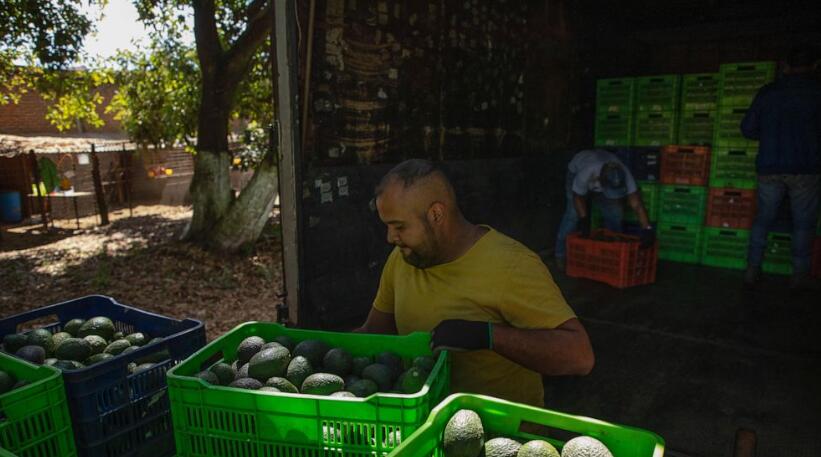It is a long and sometimes dangerous journey for truckers transporting the avocados destined for guacamole on tables and tailgates in the United States during the Super Bowl.
SANTA ANA ZIROSTO, Mexico — It is a long and sometimes dangerous journey for truckers transporting the avocados destined for guacamole on tables and tailgates in the United States during the Super Bowl.
It starts in villages like Santa Ana Zirosto, high in the misty, pine-clad mountains of the western Mexico state of Michoacan. The roads are so dangerous — beset by drug cartels, common criminals, and extortion and kidnap gangs — that state police provide escorts for the trucks brave enough to face the 40-mile (60-kilometer) trip to packing and shipping plants in the city of Uruapan.
Truck driver Jesús Quintero starts early in the morning, gathering crates of avocados picked the day before in orchards around Santa Ana, before he takes them to a weighing station. Then he joins up with other trucks waiting for a convoy of blue-and-white state police trucks — they recently changed their name to Civil Guard — to start out for Uruapan.
“It is more peaceful now with the patrol trucks accompanying us, because this is a very dangerous area,” Quintero said while waiting for the convoy to pull out.
With hundreds of 22-pound (10-kilogram) crates of the dark green fruit aboard his 10-ton truck, Quintero’s load represents a small fortune in these parts. Avocados sell for as much as $2.50 apiece in the United States, so a single crate holding 40 is worth $100, while an average truck load is worth as much as $80,000 to $100,000.
Mexico supplies about 92% of U.S. avocado imports, sending north over $3 billion worth of the fruit every year.
But it’s often not just the load that is stolen.
“They would take away our trucks and the fruit, sometimes they’d take the truck as well,” Quintero said. “They would steal two or three trucks per day in this area.”
It happened to him years ago. “We were coming down a dirt road and two young guys came out and they took our truck and tied us up.”
Such thefts “have gone down a lot” since the police escorts started, Quintero said. “They have stolen one or two, one every week, but it’s not daily like it used to be.”
State police officer Jorge González said the convoys escort about 40 trucks a day, ensuring that around 300 tons of avocados reach the packing plants each day.
“These operations have managed to cut the (robbery) rate by about 90 to 95 percent,” González said. “We accompany them to the packing house, so they can enter with their trucks with no problem.”
Grower José Evaristo Valencia is happy he doesn’t have to worry if his carefully tended avocados will make it to the packing house. Packers depend on arrangements they have made with local orchards to fill promised shipments, and lost avocados can mean lost customers.
“The main people affected are the producers,” Valencia said. “People were losing three or four trucks every day. There were a lot of robberies between the orchard and the packing house.”
The police escorts “have helped us a lot,” he said.
Once the avocados reach Uruapan or the neighboring city of Tancitaro — the self-proclaimed avocado capital of the world that greets visitors with a giant cement avocado — the path to the north is somewhat safer.
The shipment north of avocados for Super Bowl season jhas become an annual event, this year celebrated in Uruapan. It is a welcome diversion from the drumbeat of crimes in the city, which is being fought over by the Viagras and Jalisco cartels.
On Jan. 17, Michoacan Gov. Alfredo Ramírez Bedolla “kicked off” the first Super Bowl avocado shipments, literally, kicking a football through tiny goalposts on an imitation football field.
Behind him, a big tractor trailer bore a huge sign reading “Let’s Go! Super Bowl 2023.”
It was an attempt by Michoacan growers to put behind them last year’s debacle, when the U.S. government suspended inspections of the fruit in February, right before the 2022 Super Bowl.
The inspections were halted for about 10 days after a U.S. inspector was threatened in Michoacan, where growers are routinely subject to extortion by drug cartels. Some Michoacan packers were reportedly buying avocados from other, non-certified states and trying to pass them off as being from Michoacan and were angry the U.S. inspector wouldn’t go along with that.
U.S. agricultural inspectors have to certify that Mexican avocados don’t carry diseases or pests that would harm U.S. orchards. The Mexican harvest is January through March, while avocado production in the U.S. runs from April to September.
Exports resumed after Mexico and the United States agreed to enact “measures that ensure the safety” of the inspectors.
“This season we are going to recover the confidence of the producers, growers and consumers. By increasing the export production, we hope to send 130,000 tons this season,” the governor said.
